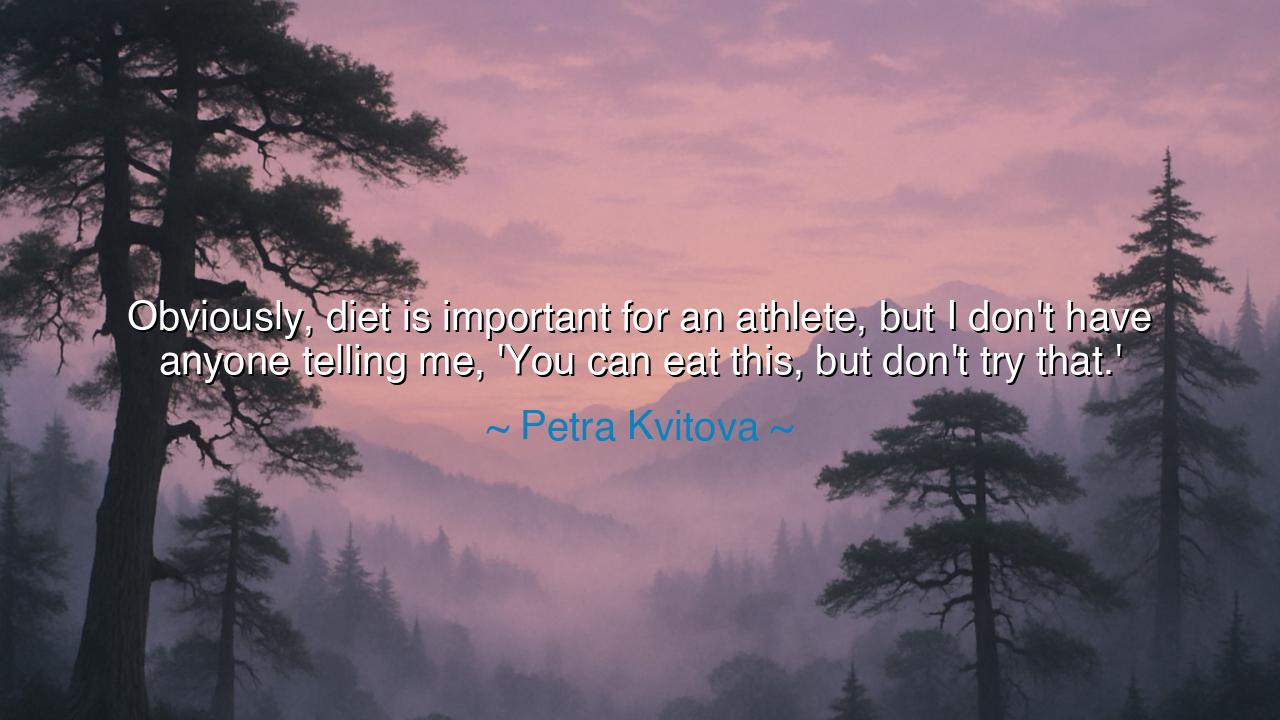
Obviously, diet is important for an athlete, but I don't have
Obviously, diet is important for an athlete, but I don't have anyone telling me, 'You can eat this, but don't try that.'






“Obviously, diet is important for an athlete, but I don’t have anyone telling me, ‘You can eat this, but don’t try that.’” — thus spoke Petra Kvitová, a warrior of the court, a champion whose strength lies not only in her arm but in her independence of spirit. Her words, though modest and simple, reveal the essence of freedom through discipline — a truth known since the dawn of philosophy and battle alike: that true mastery is not blind obedience, but conscious self-command. She speaks as one who listens not to the voices of control, but to the quiet authority of inner wisdom.
The diet, in her saying, stands as a symbol of all that sustains a person — not merely the food that nourishes the flesh, but the habits, choices, and values that shape the soul. An athlete’s life, like that of a monk or philosopher, demands sacrifice, precision, and balance. Yet Kvitová reminds us that even in discipline there must be freedom, and even in structure, trust. For what use is training if it is ruled by fear, or nourishment if it is dictated without understanding? She does not reject the importance of order; rather, she reclaims the power to govern herself — to eat, live, and play with awareness rather than compulsion.
This is no rebellion of arrogance, but a declaration of maturity. The ancient Stoics, such as Epictetus, taught that the highest virtue is self-control, but self-control born of understanding, not obedience. The one who must always be told what to do remains a child; the one who acts with inner knowledge becomes free. When Petra says she has no one telling her what to eat, she speaks as such a soul — one who has learned the rhythm of her own body, the needs of her own craft, and the quiet laws that govern her energy. This is not carelessness, but self-awareness refined by experience.
Consider the tale of Miltiades, the Athenian general who led his people to victory at Marathon. He did not command his soldiers by shouting endless orders; he trained them to think, to act with intelligence in the heat of war. Thus, when the time came, they fought not as puppets but as warriors guided by instinct and reason combined. So too does Kvitová live and train — not by constant instruction, but through discipline that has become nature. Her body has learned its truth, and her mind has learned to listen.
Her quote also reminds us of the danger of overregulation, of the modern hunger for perfection that strips life of joy. Many athletes — and indeed, many people — live under a tyranny of rules: what to eat, when to rest, how to breathe. They mistake control for wisdom and rigidity for strength. But Kvitová’s words breathe of balance. She honors the importance of diet, yet refuses to become its servant. She understands that health, like art, requires intuition — the ability to adapt, to listen, to live in harmony with one’s own nature.
In her voice there is also courage — the courage to take responsibility. To make one’s own choices is not easy; it demands attentiveness and accountability. Yet this is the foundation of greatness. The athlete who blindly follows a plan cannot innovate; the one who knows herself can rise above it. This principle is ancient, echoed in every field of mastery — from the swordsmen of Japan who trained until instinct replaced instruction, to the philosophers of Greece who sought freedom through self-knowledge.
Thus, the lesson of Petra Kvitová’s words reaches far beyond sport. It teaches that true strength lies in knowing oneself — in learning the balance between guidance and independence, between rule and intuition. Whether in diet, work, or life, follow wisdom, not dogma. Let your choices be informed, but never enslaved. Learn from others, but listen most deeply to the voice within. For only when a person becomes their own teacher do they truly begin to master their path.
So remember, O listener: discipline without freedom is bondage, and freedom without discipline is chaos. Seek the middle way, as Kvitová has — the path of mindful mastery. Feed your body with care, your mind with clarity, and your spirit with trust in your own judgment. When you walk this path, no one will need to tell you what you can or cannot do — for you will already know, as all the greats have known, how to live in harmony with your own truth.






AAdministratorAdministrator
Welcome, honored guests. Please leave a comment, we will respond soon